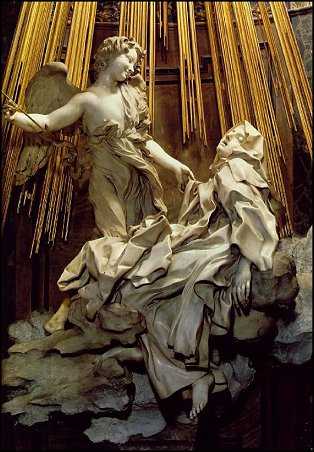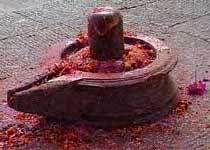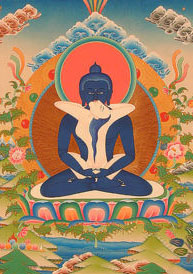Ah, so I got your attention! Yesterday, I wrote my first poem in Esperanto… unfortunately, I neglected to save it on my computer, and when my machine did one of its random reboots, it was lost and I haven’t been able to recover it. However, I wasn’t going to post it, anyway. It was, ahem, a very tantric sort of prayer, very personal, and let’s just say it didn’t hold anything back!
It was born of a powerful impression I had upon awakening, of the union of sexuality and spirituality. I sat in meditation, and while I just focussed on my breathing, the poem, in images and words, impressed itself upon me. It wasn’t marked by really any particularly strong feelings, despite some extremely passionate imagery. Horniness was the metaphor, not the message or the vehicle. (Well, a little bit of the vehicle, but not as much as you’d think.)
Sex is not only the ultimate physically unifying action, it’s also a powerful image of unification. That seems to be where my poem was coming from, the awareness that God/man, heaven/earth, Unmanifest/manifestation, are not separate, not-two, but one, no matter how it appears in this wonderful world of phenomena and differentiation.
Some questions… Did the poem come to me in Esperanto because the relative unfamiliarity of the words in that language gave me more freedom to receive them afresh… getting past decades of hearing them as “bad” words in English? Was my determination beforehand not to post the poem a tacit acknowledgment of a taboo? What is the taboo, and why is it there?
Sexuality and spirituality are considered so distinct, if not opposed, in Western religion, that it’s difficult to imagine them seriously being addressed at once. And Western religion is virtually devoid of images of sacred sexuality, something that I almost don’t notice, until I consider the yab-yum icon of the Buddha simultaneously in mediation and coitus, or the Hindu shivalingam portraying the meeting of God’s feminine and masculine qualities, graphically portrayed as yoni and lingam.
It’s as if in Western religion, the only icon of sacred sex is the hidden icon of man and wife behind closed doors, not to be seen as a whole by anyone but God alone. And even there, the spiritual symbolism is almost never touched upon, despite St. Paul’s teaching that we are the body of Christ, and that God desires for us to be united with him.
Yet to mystics, it occasionally breaks through here and there when allowed, most often in the form of poetry. The Song of Songs is eight chapters of ecstatic holy erotica, but I’m willing to bet you’ve never heard a sermon on it that didn’t bury it under ridiculous layers of symbolism.
The Spanish mystics, Sts. Teresa of Ávila and John of the Cross, bring it forth in some of their mystical writings as well. The sculptor Bernini showed that he understood the relationship of Spirit and passion in his wonderful portrayal of “The Ecstasy of St. Teresa,” wherein a key mystical experience of hers is given an undeniably erotic, though modest, treatment.
But the Spanish mystics were talking about spiritual experiences, not sexual ones. What is the place of sex in spirituality? Why have so many mystics for thousands of years, been renunciates? Why is it so often the renunciates who are the ones who elucidate sacred sexuality?
I suspect the reason lies in the tricky nature of desire. Even love is constantly confused with the desire for receiving, and sex is even more prone to seek its own fulfillment. As there is a true love that expects nothing in return, but purely exists to give, there must be a place in sex where you exist solely to give yourself away. In that place, there is nothing that is not God.
In the past, gods demanded blood and bodies. Now, Christ has given his body and blood completely, and you are that.
There. I said it; now let me have it!




Thanks for your comment re my Mood Swings, Jon. Good to get back in touch. In Blake’s Four Zoas (and many other poems) sex has a central place in his (very Christian) system. The zoas emanations (women) provide the creative energy that makes anything happen. Love and desire in the fallen state is insidious; redeemed it is closely united with the male dimension in what can only be a perfect marriage. As you point out, Paul understand the sexual nature of man and God. Hurrah!
I’ve been using about 100% of my time working on my new Blake book, a primer; once in a while I come up for air.
Blessings to you and to all.
Hey, Larry, thanks for coming by! Great to hear from you again!
Me so horny!=)
Calm down, Ned!
“Sexuality and spirituality are considered so distinct, if not opposed, in Western religion, that it?s difficult to imagine them seriously being addressed at once.”
Part of the reason why spiritual types have remained celibate IMO is, quite frankly, because it’s easier. It doesn’t SEEM easier if you try to bottle that up or redirect your sexual energy. But – especially for ‘masculine’ types – it’s easier to retreat from sensation, distraction, emotion and focus on purity. (Note that the feminine religious traditions include sexuality, sacred dance, body work, etc.)
Ah, good old fear. Fear of distraction from “purpose.” Fear of desire. Fear of pleasure. All of these things close us down to sex – the very basis of life and the energy of which spins the planets in orbit and pushes blood in one’s veins.
I’ve found that it’s only when I blast through fear and taboo that I find a oneness and fullness in life. Joe Campbell said, “The warrior’s approach is to say “yes” to life; “yea” to it all.” Can we take even the “darker” areas of life and transmute it into good? See the perfection even in that which we push aside? Ride out everything in openness and love instead of picking and choosing what creates “purity” in ourselves?
Thank God we’re moving from the phase of the divorce of spirituality and sexuality. Pioneers like David Deida are kicking ass on this frontier with books like “Finding God through Sex” (an amazing book, by the way). A great one to check out for anyone who’s interested in the topic…
Great topic, Jon.
Trev, thanks for such a well-thought and penetrating comment. I definitely agree about the “easier” aspect. I myself wanted to become a friar or monk for several years, and went so far as to inquire seriously with several orders. Turned out I’m destined for a different path, and I was quite disappointed about that for a long time.
Some of the things that seemed easier about that to me were not having to deal alone with so much of the tedious worldly stuff… daily schedule, paying bills, traffic, enduring jobs at the time that I hated… when I could focus more on what was really most important to me, and be more available as a teacher and spiritual guide.
I wasn’t expecting sexuality to be easier in that sort of environment. I was expecting to be dealing with many temptations. And I don’t think fear of sexuality is a major reason for most taking the renunciate path although it’s undoubtedly a factor for many… At best the motivation is to work on the ego and cultivate selflessness and a deeper relationship with God.
However, I’m completely with you on the need for an integration of sexuality and spirituality. I love the positive potential of Deida’s work. The one chapter in Pronoia that really stood head and shoulders above the others, to me, was the one on sacred sexuality. And Barry Long is another teacher, recently deceased, who’s contributed a lot to this area.
I think it was Pagel’s who described the early church in conflict over sexuality. It was a sort of traditional Judaism fighting the sexual practices of the Greeks and Romans (homosexuality, infidelity, etc.) and the Greeks and Romans fighting against the practices in Judaism (i.e. polygamy, etc.) The synthesis of the two opposing sides ended up just being repression of the whole topic. Because of the conflict, there was a lot of writing on the topic, and in turn a lot of the writing ended up as core teachings of the church. And the church ended up influencing most thought in the west for quite a while.
There were also the ones like Trev described; however, the monastic movement really started after this debate had been going on a while. And then you get crazy monks and nuns.
So much writing and teaching on this subject that I don’t think the church will ever be free of it. There are movements now, but the fundies get scared and fight back. Good old fundies. The biggest problem with the traditional stance is that it doesn’t work in a contemporary environment. Maybe if all the women wore burqas or walked on different sidewalks, or if we didn’t allow mixed bathing they wouldn’t have to worry about this ever again!
Good post. I had been meaning to post on this a while back, from a different perspective, but I never finished the post. I’ll have to see what I have saved.
The Taliban tried it… didn’t work!
There needs to be tolerance and room for all varieties of spirituality with all degrees on the integration/sublimation spectrum.
India seems to be the most accepting, with Tantra on one end and ascetic yogis on the other.
Mmmmm, sacred sex. 😉
Great post, Jon. Lots of food for thought. Especially this question: “Why is it so often the renunciates who are the ones who elucidate sacred sexuality?”
Proclaiming the holiness of sexuality while renouncing it: a great example of Christian double-speak. Reminds me of an account I recently read of the Pope trying to explain how clerical celibacy is both church-mandated and voluntary at the same time.
This kind of double-speak is characteristic of much of Christendom today, the branches that have as their central message, “Jesus loves you just as you are – but you’re gonna have to change and follow these rules, else you’ll burn in hell for all eternity.”
Yes, most Christians will say that sex is a God-given gift, but then they put rules and restrictions on it that exclude many of us (i.e., it has to be within the context of a life-long monogamous heterosexual marriage), thereby robbing sex of its gift-ness. That’s why so many can’t talk about the Song of Solomon without burying the erotic language “under ridiculous layers of symbolism.”
Thanks for a well-presented piece on a subject that demands much more open discussion. I have long felt that Western religion and culture simply handed down this legacy of shame and sin regarding sexuality as another means of control. We are sensual/sexual beings and, if we are indeed created in the image of the Divine, then it follows that the Divine is the same. Had we never been exposed to the idea that sex is in most cases sinful, how much more pleasure could we experience in everything from the Divine to the everyday? Not to mention that the Divine is in every part of the so-called everyday. If everything is sacred and issues from the Divine, how did sexuality and sensuality become the only exclusions. Very sad, indeed.
Funny, I was kinda thinking about this earlier (weeks or days, i think).
Haven’t gotten to that chapter of Pronoia yet; it’s been slow going on that one.
Trev’s comment was awesome. I can definitely understand the “fear” factor – so many Christian churches demonize sex and fail to celebrate anything about it. I share Trev’s frustrations, and Darrells.
Anyway, it’s a good topic upon which I haven’t seen much serious discussion, though it has occasionally come up with friends (though it tends to fix on the negative aspects).
I just saw a work email pop up. How disconcerting it is to go from considering such an engaging topic to one (though engaging enough) so mundane!
And I misread the tab as “The Wild Things of Sex” – so I’d like to suggest that you rename the post.
More thought later, and perhaps some writing.
“What is the place of sex in spirituality?”
What exactly do you mean by spirituality? Because of your question, I wondered, Is there such a thing as spirituality? No, I don’t think so. Maybe I’ll just stop using the word.
Perhaps, instead of spiritual life and regular life, or regular life and sexual life, there is Mystery? Everything is as it is. We are as we are. In which case, any concern about sexuality disappears.
“Why is it so often the renunciates who are the ones who elucidate sacred sexuality?”
Obviously, because they’re not getting any. Simple biology.
Your post was great. Please don’t mistake my humor for disrespect. Just thought I’d add my two cents. I tend to like the simplest explanations the best.
Great responses, and thank you to all.
I’m going to continue this comment as another post.
Apparently Sting recently said that he makes love in order to get closer to God. In the Jewish tradition, the seventh day of creation (the Sabbath) is known as God’s wedding day, when s/he married the world.
Wicca is very much about sacred sexuality, though the theology isn’t as complex as that of older traditions (we’re working on it).
For me, spirituality is sexual, and sexuality is spiritual – they are overlapping domains. The higher chakras fire up the lower chakras, and the lower chakras fire up the higher chakras, is another way of looking at it.
All best, and keep up the good work.
Song of Songs is the hottest poetry set to writing. Yow!
:calms down:
:not: